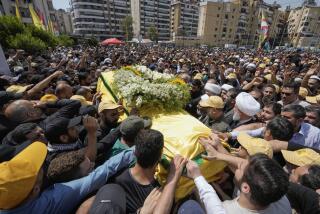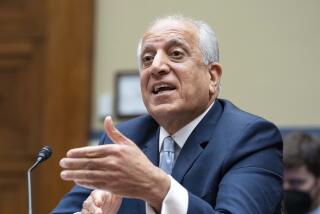Pakistani Taliban names new leader
- Share via
ISLAMABAD, PAKISTAN, AND PESHAWAR, PAKISTAN — Faced with the prospect of rifts among its ranks after a U.S. drone strike apparently killed leader Baitullah Mahsud, the Pakistani Taliban announced Saturday that it had chosen one of his deputies to succeed him.
A 28-year-old commander named Hakimullah Mahsud will lead Tehrik-e-Taliban Pakistan, a militant organization based in the tribal areas along the Afghan border and blamed for many of the suicide bombings and other attacks that have plagued Pakistan.
Experts say Hakimullah Mahsud, who isn’t related to the former leader, has a reputation for being just as ruthless but lacking his predecessor’s ability to keep rival factions unified. Far from being cohesive, the Taliban in Pakistan is a loose coalition of tribal militant groups that Baitullah Mahsud had pulled together under one banner in 2007.
“Baitullah Mahsud was able to build consensus within the Taliban,” Pakistani defense analyst Ikram Sehgal said. “It’s unknown whether Hakimullah will be able to unite these disparate factions.”
Pakistani intelligence officials have said that the Taliban has been embroiled in clashes over the succession since the drone strike. At one point, security officials claimed that Hakimullah Mahsud had been killed in one of those clashes, but the Taliban commander called several news outlets the next day to say he was alive and to deny that the Taliban was fragmenting.
Baitullah Mahsud is believed to have been killed Aug. 5 by a U.S. drone strike in South Waziristan, a tribal region in northwestern Pakistan that is the militant group’s base.
The Taliban continues to deny Baitullah Mahsud’s death. Even as Taliban leaders announced a successor, they said Mahsud was alive but too ill to continue leading the group. But Pakistani and U.S. officials say they are all but certain that he died in the airstrike.
Faqir Mohammed, a Taliban commander from the tribal areas’ Bajaur region, called news media Saturday to announce Hakimullah Mahsud’s appointment by a 42-member council of militants held several days ago.
In making the announcement, Mohammed said the Taliban was willing to open a dialogue with the Pakistani government. But officials have said they will continue with their strategy of choking off the Taliban’s supply routes and using aerial strikes to bombard its hide-outs.
A truce in the country’s volatile Swat Valley region broke down this year when Taliban fighters refused to lay down their arms and instead expanded their reach to within 60 miles of Islamabad, the capital. The government sent troops into Swat in late April in an all-out assault that displaced more than 2 million Pakistanis.
--
Ali is a special correspondent.
More to Read
Sign up for Essential California
The most important California stories and recommendations in your inbox every morning.
You may occasionally receive promotional content from the Los Angeles Times.













